Agriculture & Environment
Mak Launches Phase II of the RUFS Project to Strengthen Climate Resilience & Food Security in Kasese & Mbale Districts
Published
4 months agoon
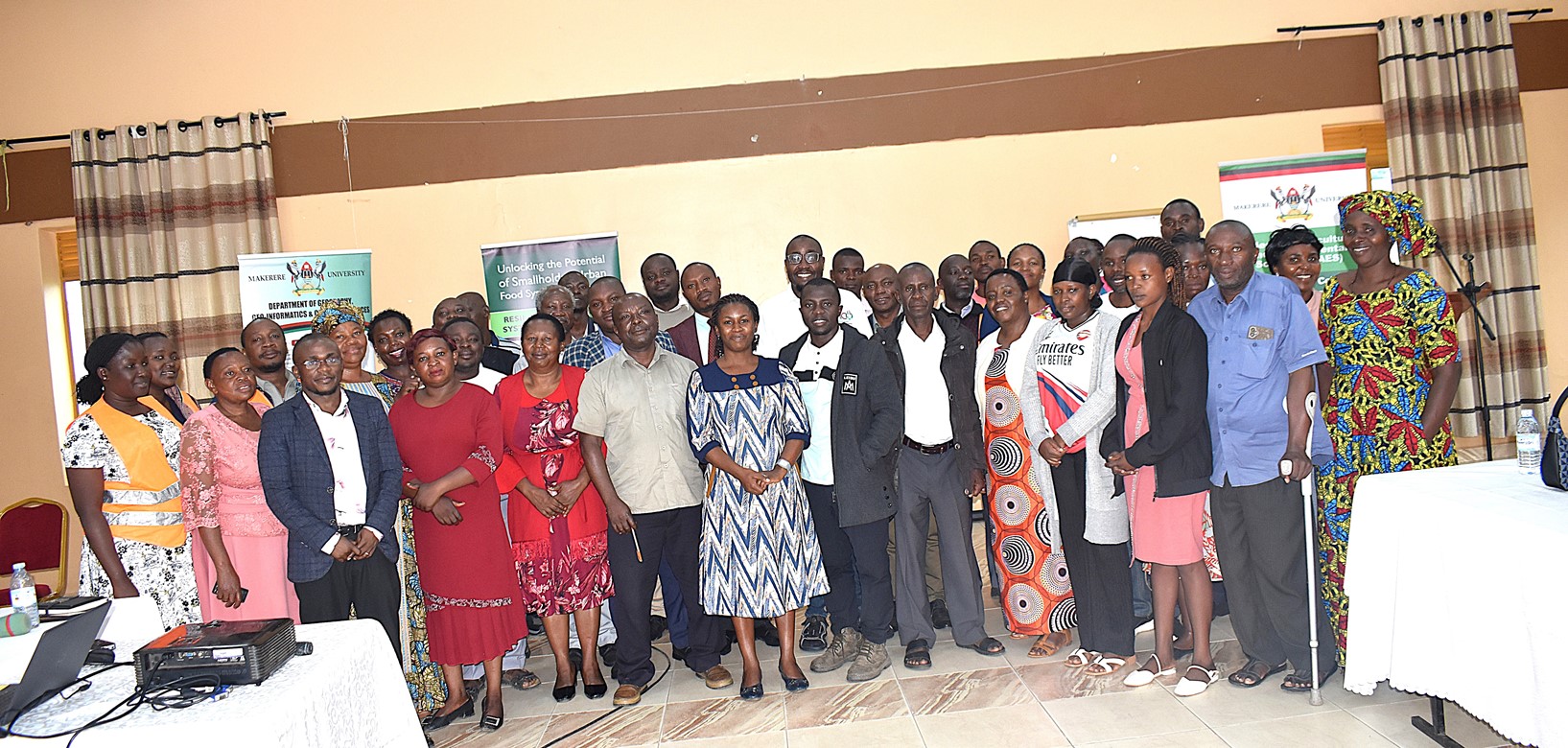
Following the success of its initial phase, Makerere University has launched Phase II of the Resilient Urban Food Systems (RUFS) project, aimed at deepening food security and climate resilience in Kasese Municipality and Mbale City. Funded through the AgriFoSe2030 programme and coordinated by Prof. Frank Mugagga of the Department of Geography, Geo-Informatics, and Climatic Sciences at Makerere University, the project continues to address urban food system challenges through inclusive, climate-smart, and community-driven solutions.
Achievements registered under Phase I of the RUFS Project
Phase I of the RUFS Project delivered a range of impactful outcomes aimed at building more inclusive and sustainable urban food systems. The achievements included:
- Formation of smallholder farmer platforms
- RUFS established the Kasese and Mbale City Food Systems Platforms, empowering smallholder farmers to actively shape resilient urban food systems.
- Multi-stakeholder collaboration
- The project facilitated dialogue among farmers, civil society, private sector actors, and local governments to improve coordination and governance.
- Exposure and exchange visits
- Learning exchanges and site visits enabled peer learning, spurred innovation, and encouraged the adoption of best practices across urban and peri-urban farming communities.
- Capacity building for local experts
- The project enhanced the technical and organizational capacities of local professionals, empowering them to lead and sustain resilient food system initiatives.
- Resource commitment from local governments
- Tangible commitments from local leaders demonstrated strong political will to support inclusive urban food systems.
- Recognition of smallholder farmers
- The contributions of smallholder farmers gained greater recognition, acknowledging their essential role in ensuring food security and urban resilience.
- Amplification of local voices
- Community stories, practices, and lessons were documented and shared widely, helping to shape urban food policies from a grassroots perspective.
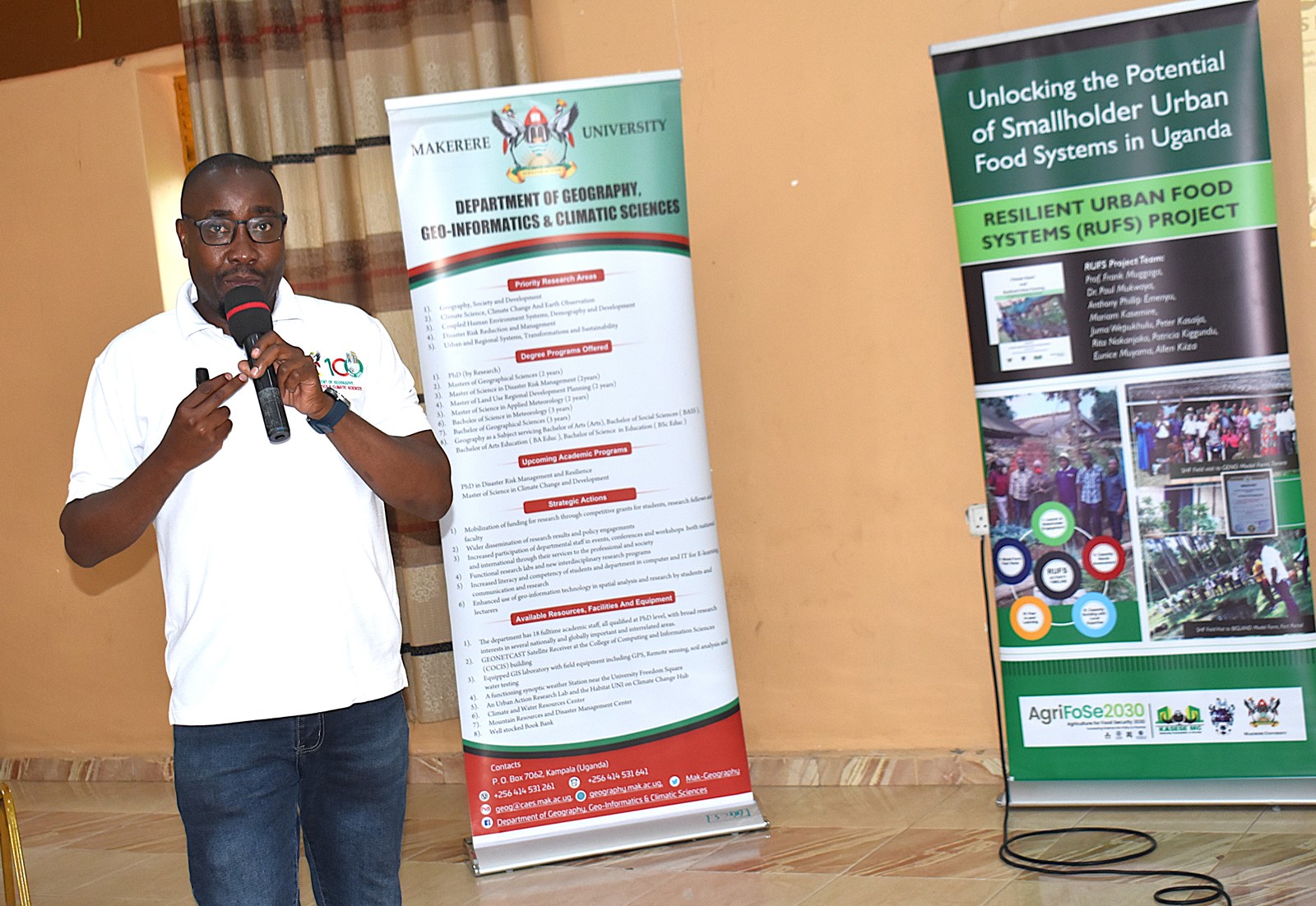
Goals and focus of Phase II
Phase II of the RUFS project sets out to: 1) Strengthen flood and drought resilience in urban communities through strengthened stakeholder collaboration in Kasese and Mbale, 2) Raise community awareness on climate risks and equip residents with preventive and adaptive skills, 3) Integrate indigenous and local knowledge into policy and planning for more context-relevant decision-making, and 4) Co-develop knowledge with both state and non-state actors to promote inclusive and evidence-based decisions.
To achieve these goals, the project will strengthen partnerships with key stakeholders, including the Ministry of Water and Environment, AidEnvironment, and potentially the Kampala Capital City Authority (KCCA). It will engage a range of expertise, including flood and drought modeling, spatial analytics, economic assessment of loss and damage, and the reconstruction of socio-hydrological histories of river flows to inform current debates. Participatory methods will be central to the project’s approach, including charrettes (with role plays), walkshops and transect walks, participatory community mapping (of resources, actors, and hotspots), peer-to-peer learning, and experiential learning activities. The core team will be expanded to include policy actors, and innovative partnerships will be developed with government programmes such as the Parish Development Model (PDM) and Operation Wealth Creation (OWC). The project will also explore opportunities for shared use of limited public land for demonstration purposes, and emphasize co-creation of knowledge among all stakeholders.
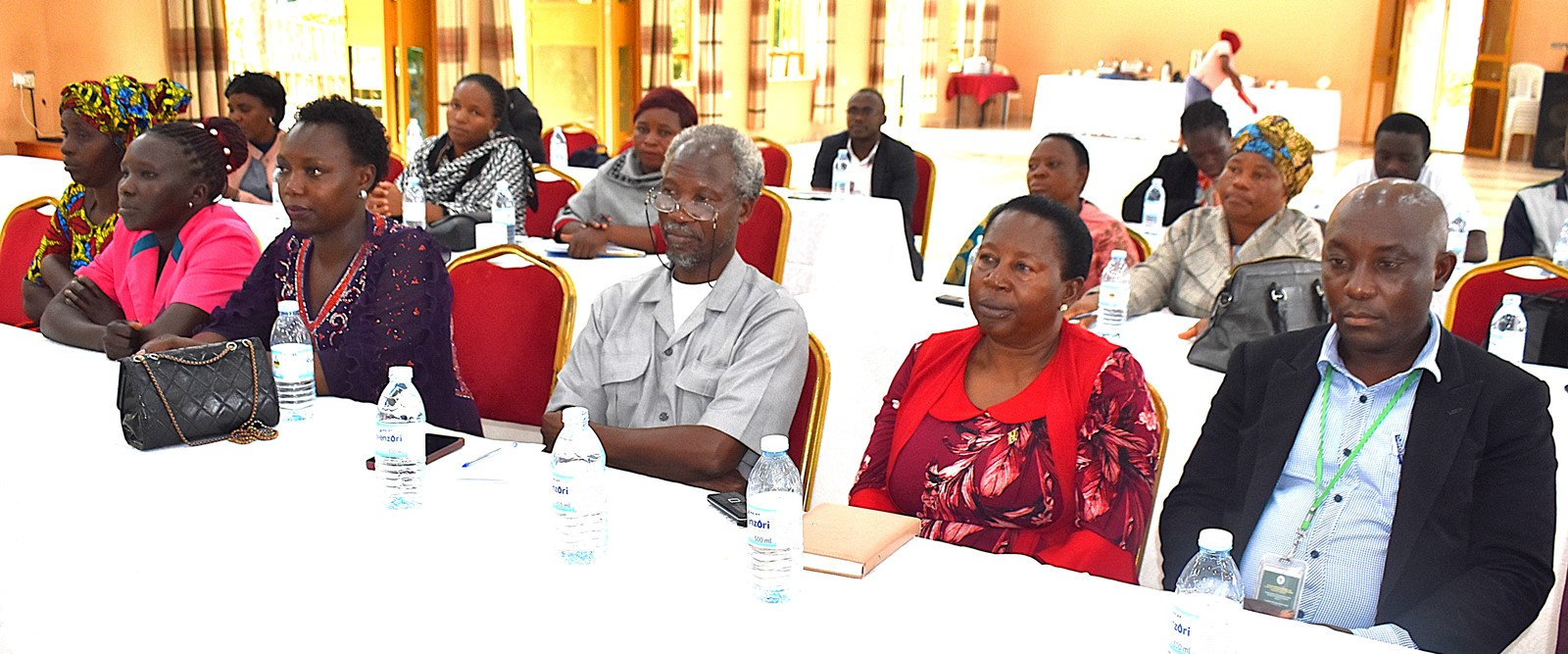
RUFS Phase II stakeholder engagement in Kasese
The RUFS project team, led by Prof. Frank Mugagga, conducted a stakeholder engagement in Kasese from 17th to 20th August 2025. The primary objective of the engagement was to formally introduce the extension phase of the project and to foster in-depth discussions with key stakeholders on strategies aimed at enhancing and strengthening the ongoing operations.
The event brought together a diverse group of participants, including representatives from the local government, community leaders, implementing partners, and technical experts. Through collaborative dialogue and knowledge sharing, the team sought to align the project goals with community needs and to ensure effective coordination amongst all parties.
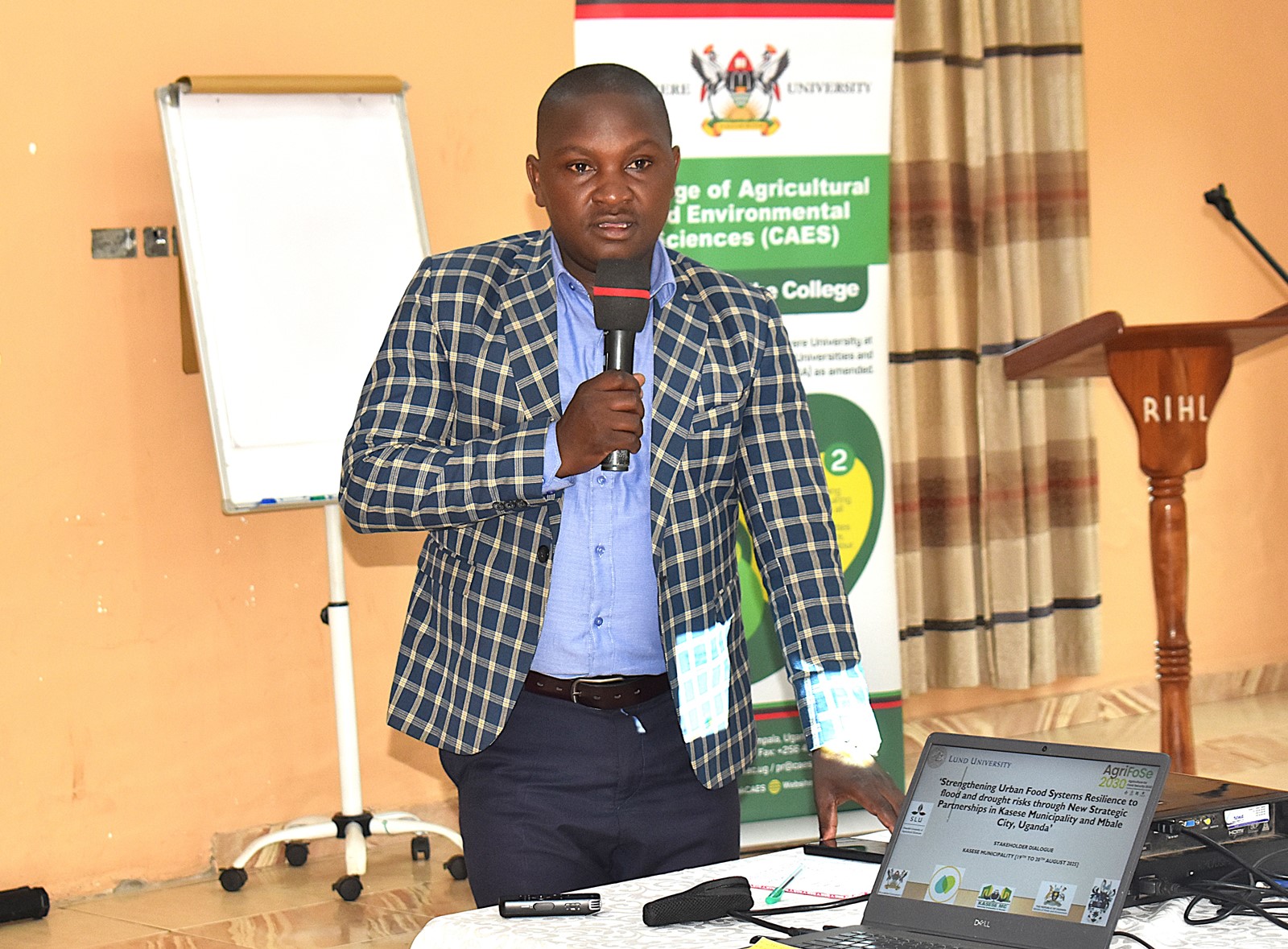
The engagement provided a vital platform for stakeholders to offer insights, address challenges, and contribute to the development of sustainable solutions that will drive the success of Phase II of the project.
Highlights from the workshop
Held at Rwenzori International Hotel in Kasese, the two-day workshop featured targeted presentations on enhancing smallholder farmers’ resilience to climate change, effective emergency response mechanisms in the face of climate extremes, and the role of advocacy in advancing community-led climate adaptation strategies.
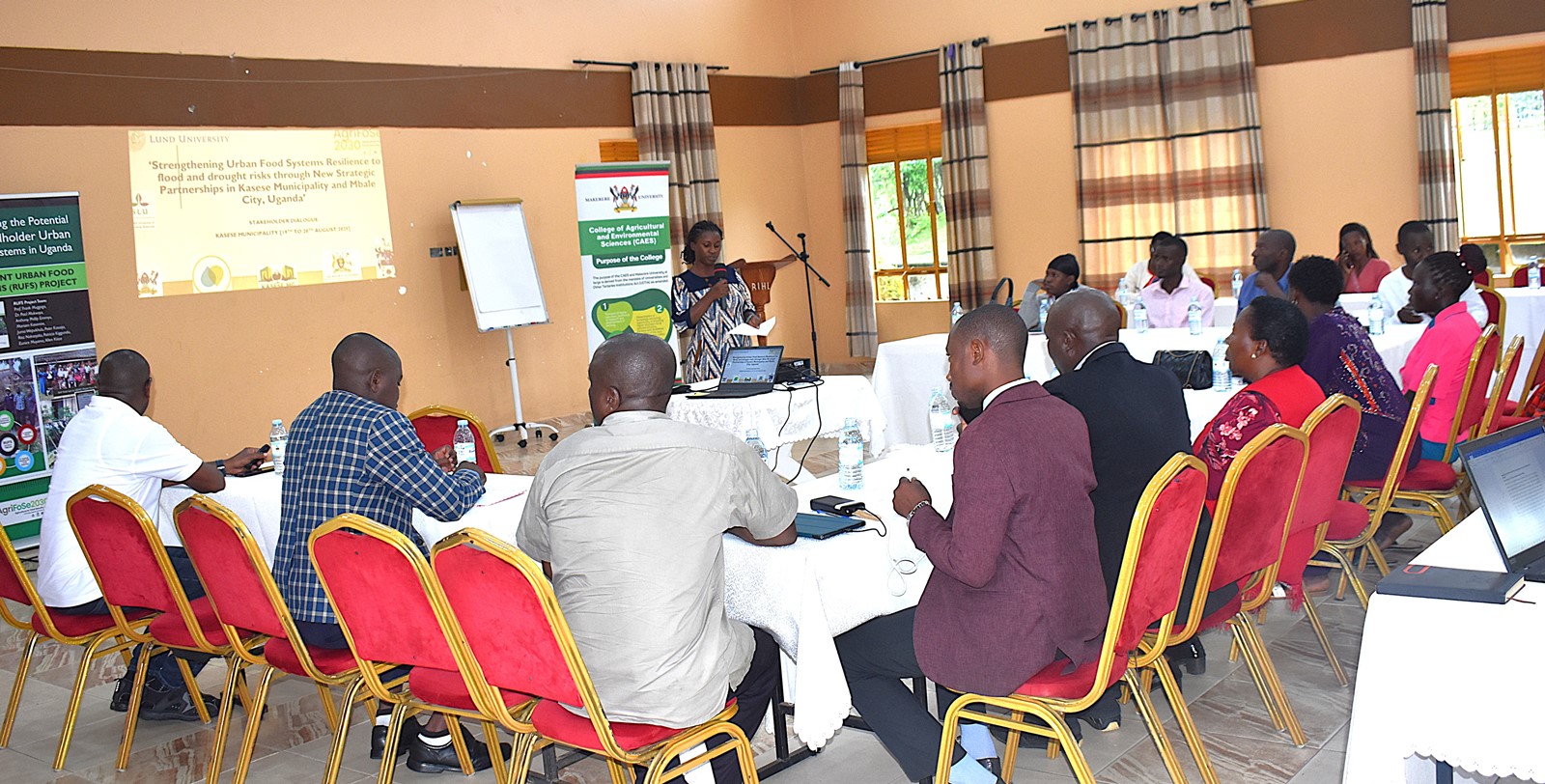
In their presentation, Mr. Henry Stanley Mbowa (AidEnvironment) and Mr. Muhindo Assanairi Bukanywa (Kasese Agricultural Officer) shared insights on climate-resilient agronomic practices, covering a number of topics including land preparation, crop management, pest control, water conservation, postharvest handling, and market access.
Mr. Kipurah Gideon briefed participants on the role of the Uganda Red Cross Society (URCS) in emergency response, offering an insightful overview of the organization’s operations within disaster management frameworks. In relation to the RUFS Project, which focuses on enhancing urban resilience and food security, Mr. Kipurah explained how URCS integrates emergency response strategies to mitigate the impact of crises on vulnerable populations.
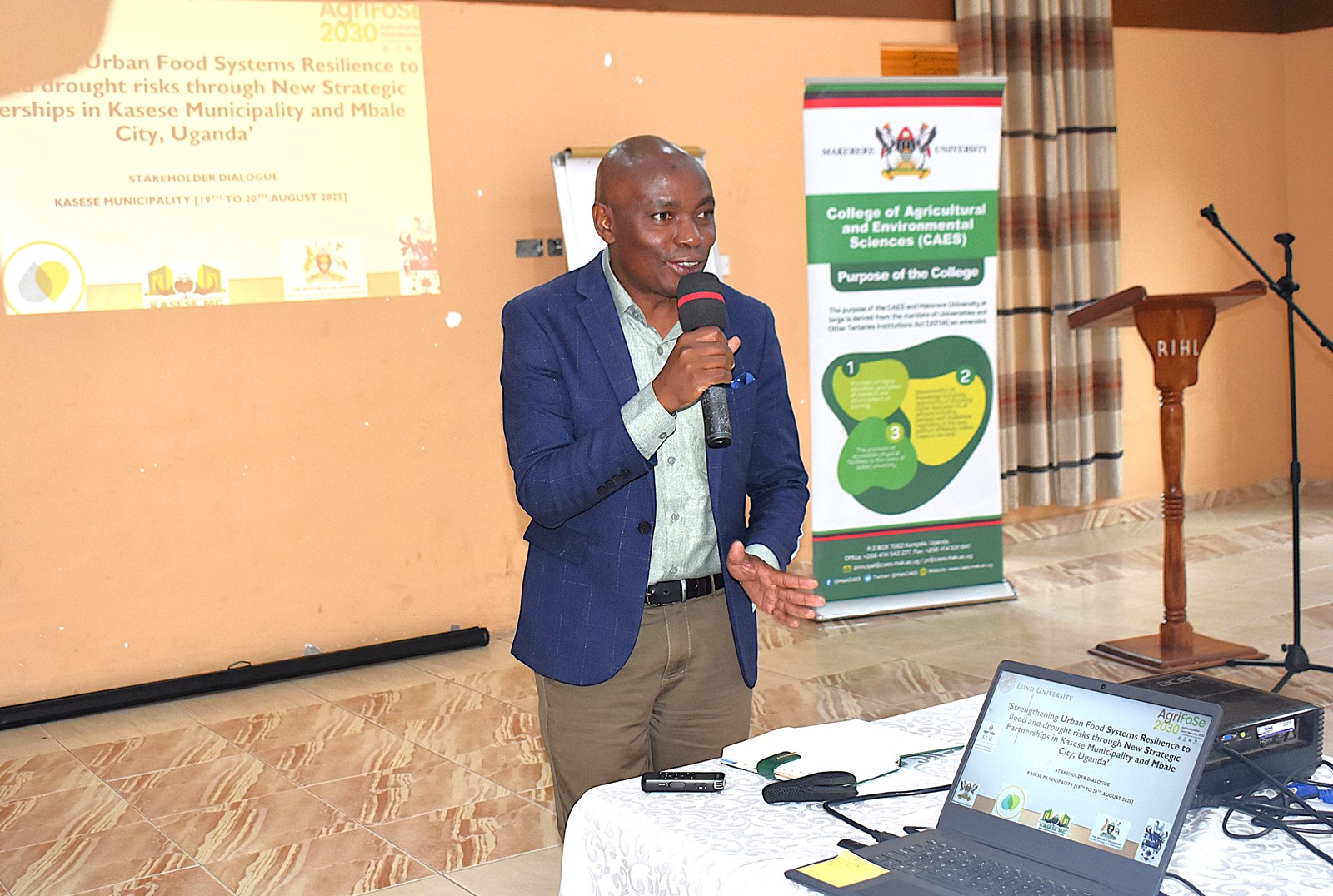
In his address, Mr. Lhughabwe Wilson, Principal Community Development Officer, Kasese Municipality, emphasized the pivotal role of advocacy in building climate-resilient communities. He noted that effective advocacy enables local stakeholders to influence policy, mobilize resources, and promote sustainable, community-driven solutions, all critical to developing resilient urban food systems in the context of growing climate uncertainties.
Remarks and success stories by the RUFS Champions
During the workshop, RUFS champions alongside several farmers from Kasese Municipality shared their success stories, highlighting the positive impact their initiatives have had on the community. Ms. Eunice Muyama, a Physical Planner from Mbale City and a committed RUFS Champion, emphasized the need to integrate urban farming into wider infrastructure development plans. She highlighted the challenges brought about by rapid urbanization, which continues to consume valuable land and reduce green spaces. “It is vital that we implement innovative planning strategies to make the most of even the smallest plots of land.” To set a practical example, she personally practices urban farming at her home, demonstrating that it is both feasible and beneficial to cultivate crops within city environments.
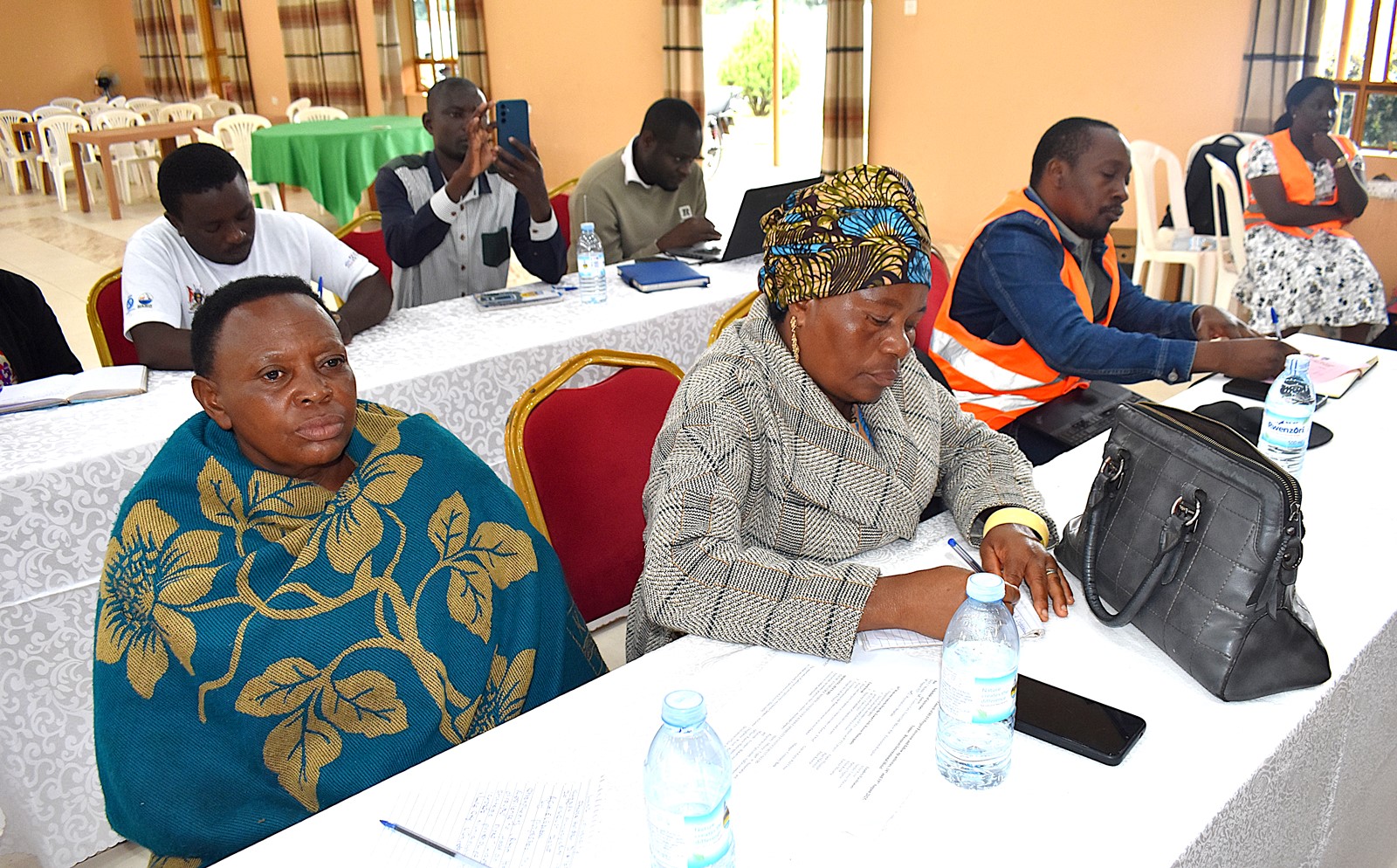
Mr. Juma Wephukhulu, a dedicated urban farmer in Mbale City credits the support of the RUFS Project for his transformative journey from a small-scale backyard gardener to a prominent agricultural entrepreneur and community mobilizer. In 2012, inspired by the story of a Kenyan woman who turned her backyard garden into a thriving vegetable supply business for Nairobi’s hotels, Juma made a life-changing decision. He resigned from his job of managing a guest house and embarked on a mission to replicate similar success through urban farming. With only 45,000 Ugandan shillings and a family of six in a rented home, his resolve to succeed was unwavering. “I was driven by the idea that wealth and opportunity can be right on your doorstep,” Juma said.
Starting in 2014, Juma laid out a detailed plan to establish a demonstration farm and training centre, supply fresh vegetables to neighbours, sell seedlings and mature plants, produce organic manure, and train local farmers. Despite challenges like the COVID-19 pandemic, his enterprise thrived, gaining traction through media appearances and community workshops.
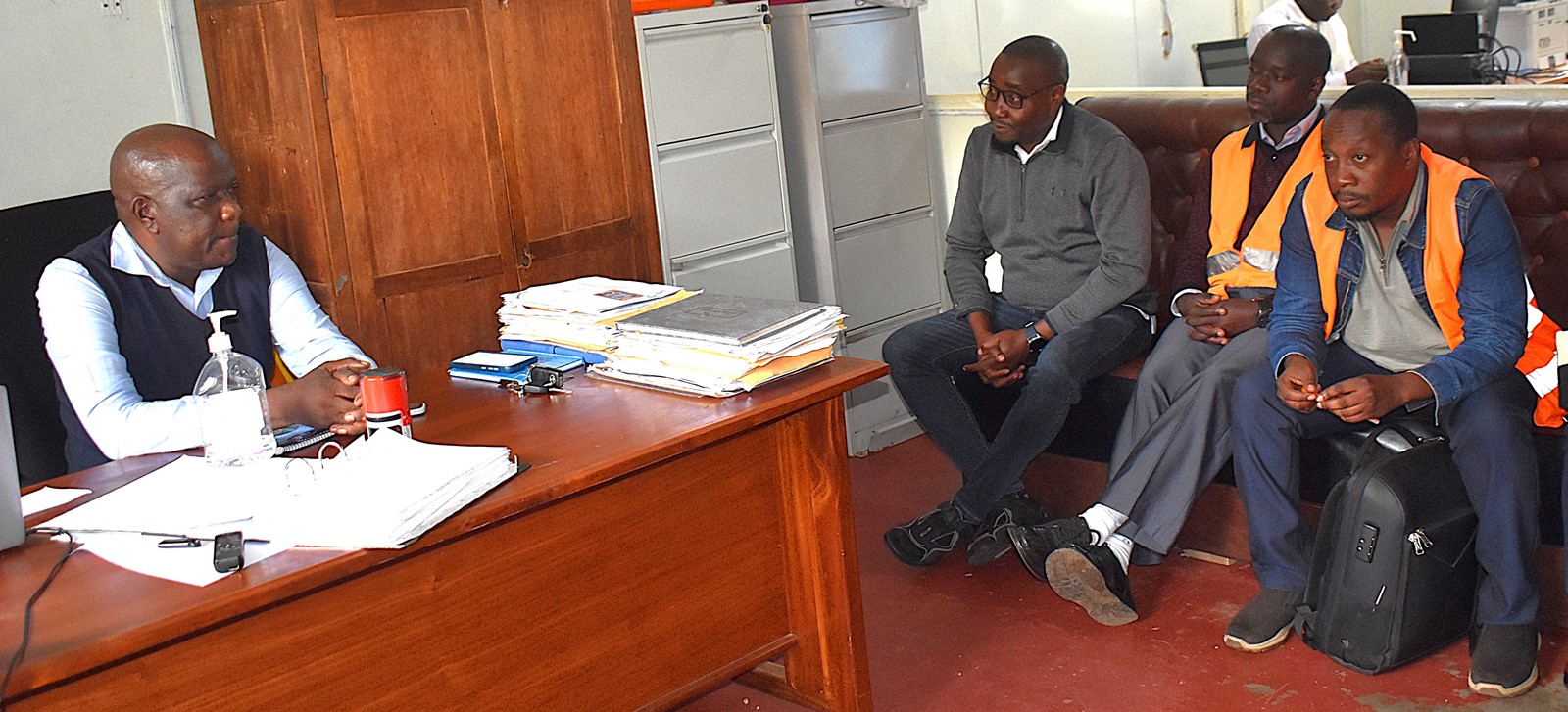
A significant turning point came in 2021 when Juma was selected to participate in RUFS activities in Mbale. With the involvement of RUFS, Juma’s farm and leadership abilities gained greater recognition. He was elected Chairperson of the Mbale City Food Systems Platform (MCFS), further amplifying his impact in the region. The project support went beyond training and resources; they sponsored Juma and his colleague Mary to attend the prestigious Harvest Money Expo in Kololo, providing funds for food, transport, accommodation, and allowances. The project also facilitated media documentation of Juma’s success story through NBS and Salt TV, helping share his inspiring journey widely.
With RUFS assistance, Juma and his team registered their platform as a Community-Based Organization (CBO) in August 2022, gaining official recognition and access to wider partnerships. He recently completed a book chronicling his farming experiences, supported by RUFS, to inspire and educate others. “The RUFS Project has been instrumental in my growth, not just financially but in exposure, training, and networking. Their support has enabled me to dream bigger, including plans to establish a 10-acre incubator farm integrating crops, fish farming, poultry, and more,” he narrated.

Ms. Eunice Mutooro Sunday, an urban farmer in Kasese and lead smallholder on the RUFS Project, has become a passionate advocate for urban and kitchen farming in her district. Through her active participation in the RUFS Project, Ms. Mutooro gained invaluable exposure to innovative urban farming models and acquired advanced agricultural techniques that have significantly enhanced her farming practices. This experience not only deepened her knowledge but also ignited a strong passion to empower others around her. As a respected leader within her local church, she leverages her influential position to mobilize community members and champion sustainable agricultural practices. She has become the primary ambassador of the RUFS initiative in her congregation, where she leads training sessions focused on kitchen gardening and sanitation. To foster enthusiasm and engagement, she introduced friendly competitions among households, encouraging them to cultivate and consume a minimum of three different types of vegetables from their own gardens. This innovative approach has successfully motivated many families to embrace home-grown produce as part of their daily diet. Through her tireless efforts, she encourages everyone to become proactive agents of change.
Mr. Edrick Bwambale, a smallholder farmer based in Kasese Municipality explained how the RUFS Project inspired him to mobilise fellow youth to establish an organization focused on promoting sustainable agri-food systems. The organization, known as ‘Sustainable Agri-Food Initiative (SAFI)’, is now working to address key challenges in food systems within Kasese District.
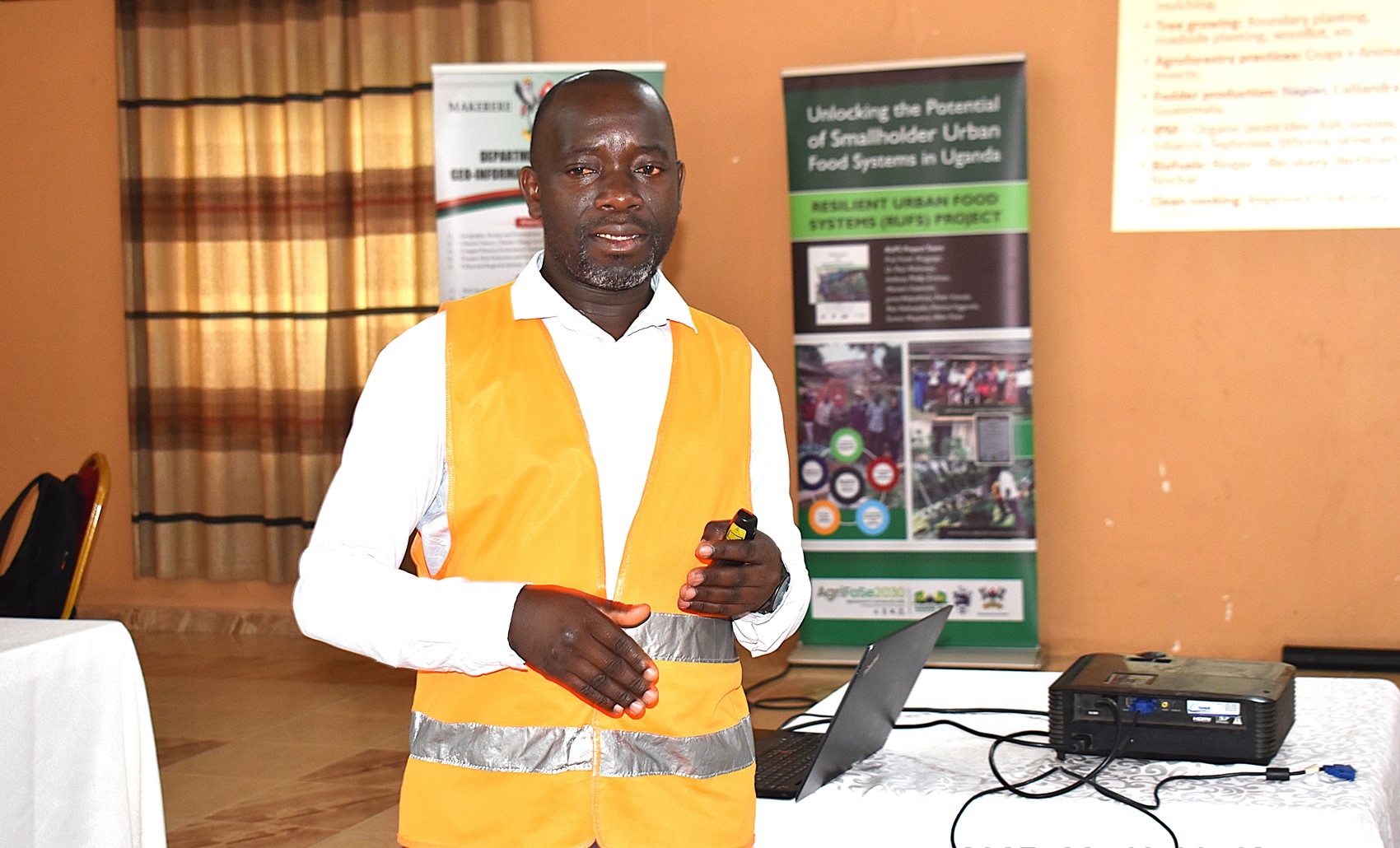
Remarks by the district officials
Addressing the participants, the Deputy Mayor of Kasese Municipality, Mr. Mapungo Rabson, together with the Deputy Town Clerk, Mr. Kambasu Zedekiah Kayiri, expressed appreciation for the RUFS project. They commended its forward-thinking and strategic approach in addressing the complex challenges facing the district, particularly those arising from rapid urbanization. Both officials emphasized that initiatives like RUFS are essential for promoting sustainable development, enhancing food security, and building the resilience of urban communities amidst increasing environmental and socio-economic pressures. The Deputy Mayor emphasized the need for a sustainability plan to ensure that the benefits of such initiatives are maintained and enhanced over time.
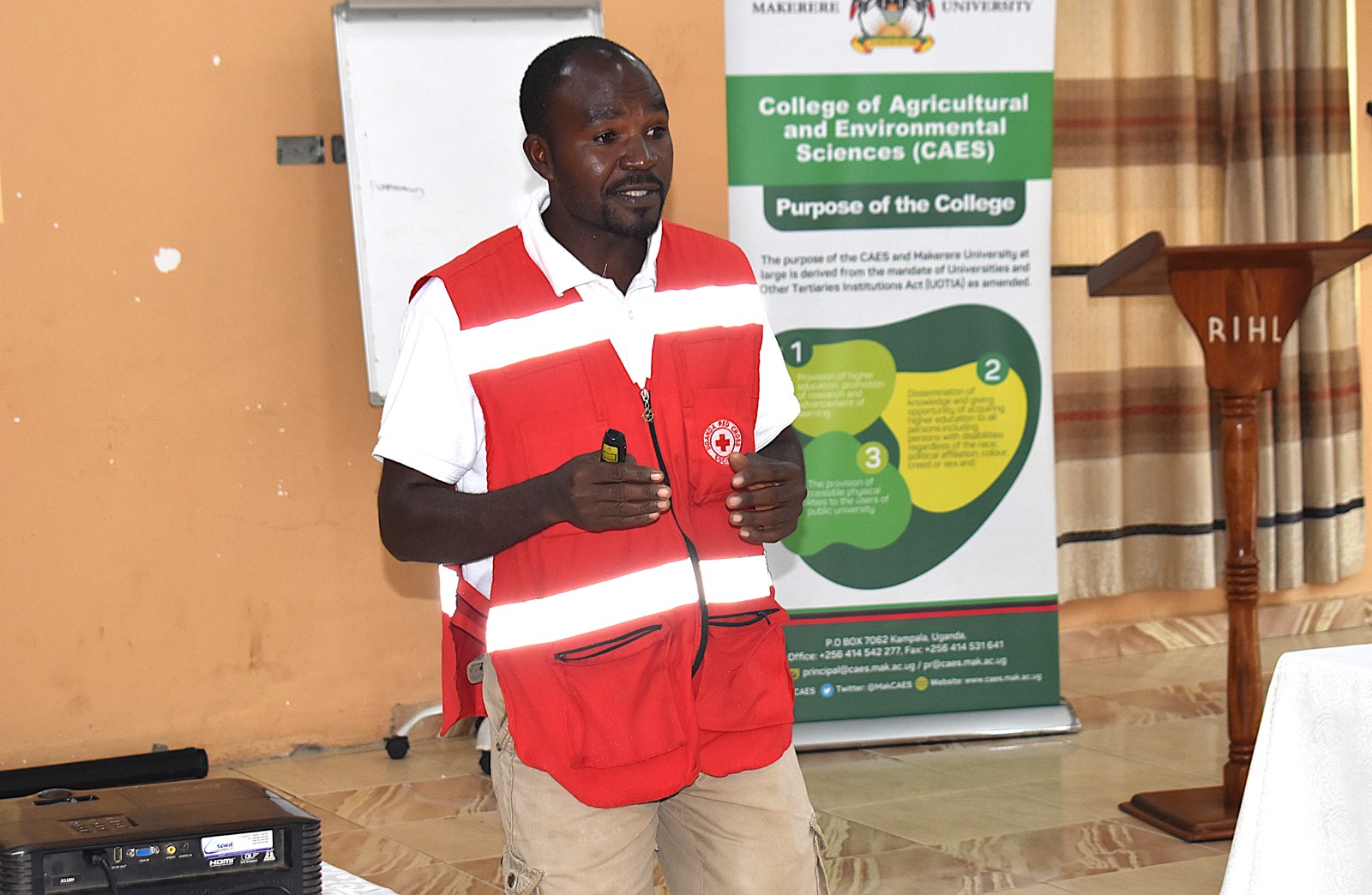
Assessment of the progress of RUFS Phase II
At the end of the workshop, the RUFS team conducted site visits to assess the progress of Phase I initiatives. One such visit was to Mobuku II Cooperative Society, a farmer group established during Phase I that now includes 385 members, many of them women and youth. The cooperative has successfully secured fair contract farming deals, embraced agribusiness, and adopted climate-smart practices.
During the visit, in-depth discussions were held with cooperative leaders to identify opportunities for RUFS to continue strengthening support for smallholder farmers in Kasese. The dialogue focused on scaling sustainable farming techniques, improving market access, and enhancing the cooperative’s capacity to build resilience against climate-related challenges.
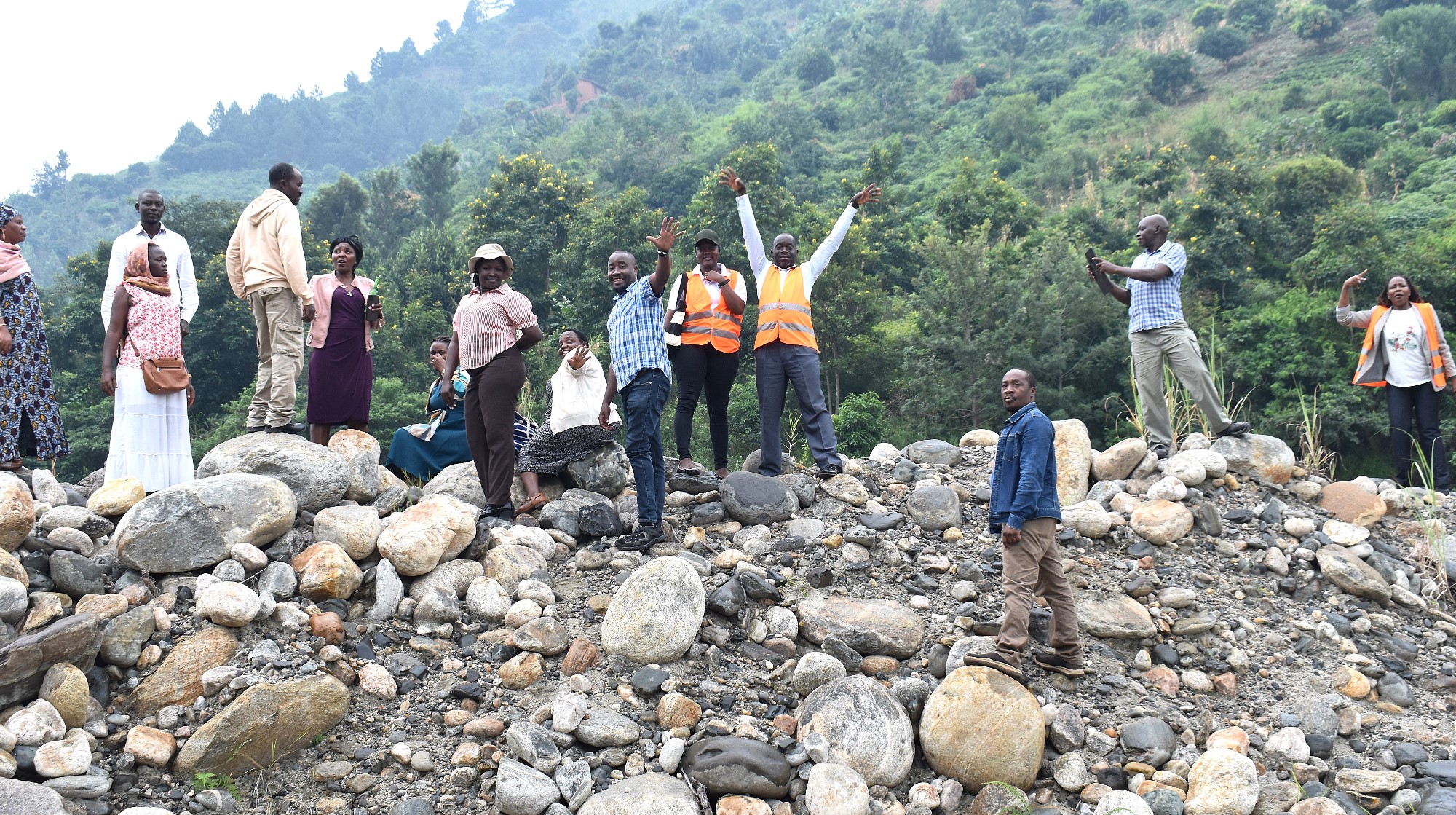
Way forward to ensure sustainability of the RUFS Project
Participants proposed that the municipality allocates land for community demonstration projects. Moving forward, Phase II of the project will focus on establishing and developing local demonstration sites. These sites will serve as key platforms to showcase tangible progress, innovative approaches, and best practices to stakeholders and the broader community. This strategy aims to encourage greater engagement, facilitate knowledge sharing, and promote the replication of successful models, thereby ensuring scalability and sustainability of the RUFS Project.
The project team held a similar engagement in Mbale City from 24th-27th August 2025.
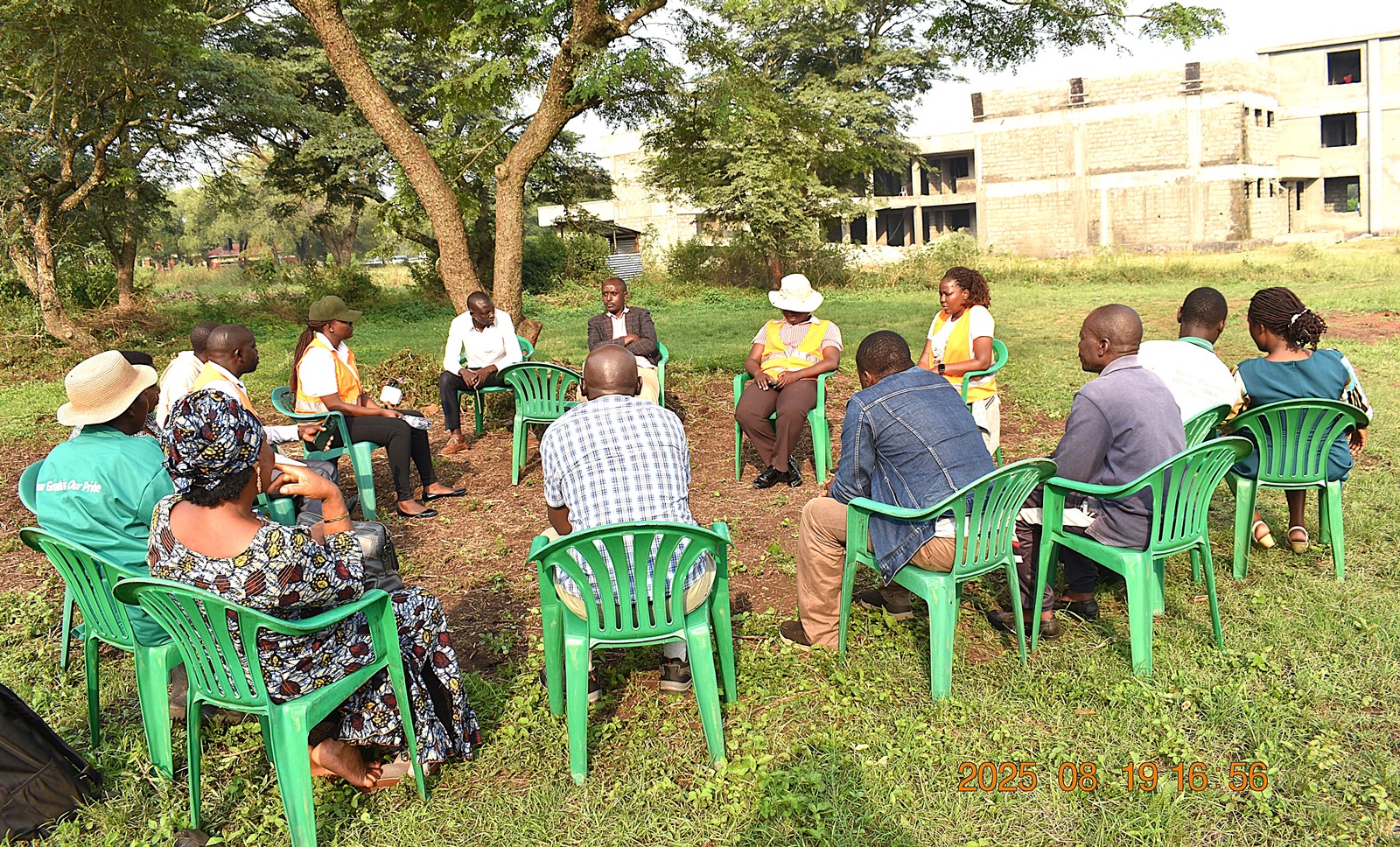
Pictorial of the RUFS Project stakeholder engagement in Kasese Municipality –
https://drive.google.com/drive/folders/1XM64I-bKTvGb-uN_w9jIxaAuOWJwFSZX?usp=sharing
You may like
-
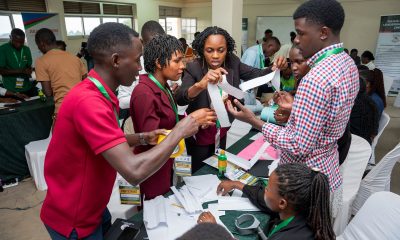

UNDP and JNLC hold training in Fort Portal: Participants equipped with skills in Advocacy and Gender Equality, Team Building, Inclusive Leadership, and Financial Literacy
-


Makerere University Launches Knowledge-Sharing Platform to Drive Innovation and Economic Growth
-
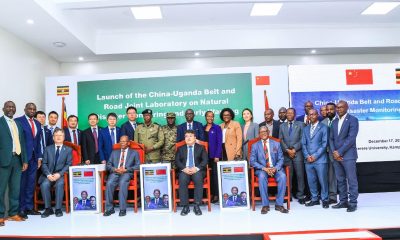

Makerere University and Tsinghua University Launch Landmark China–Uganda Joint Laboratory on Natural Disaster Monitoring and Early Warning
-
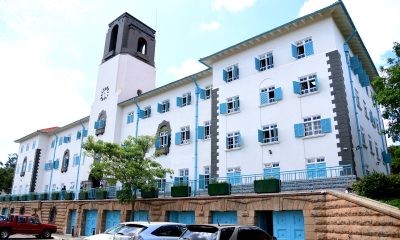

US$ 162m KEXIM Loan Approval Timely for Makerere University
-
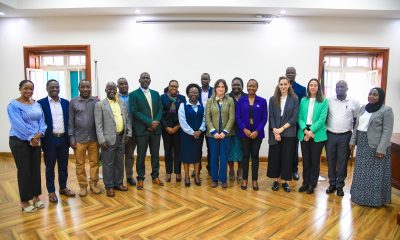

Makerere University Hosts EU Delegation to Review Institutional Engagement in EU Cooperation Programmes
-


Makerere University Explores Strategic Partnership with Tsinghua University in Safety Science, Disaster Resilience and Public Health
Agriculture & Environment
Mak-CAES Trains Small-Scale Processors on Soybean Value Addition & Product Development
Published
3 weeks agoon
December 16, 2025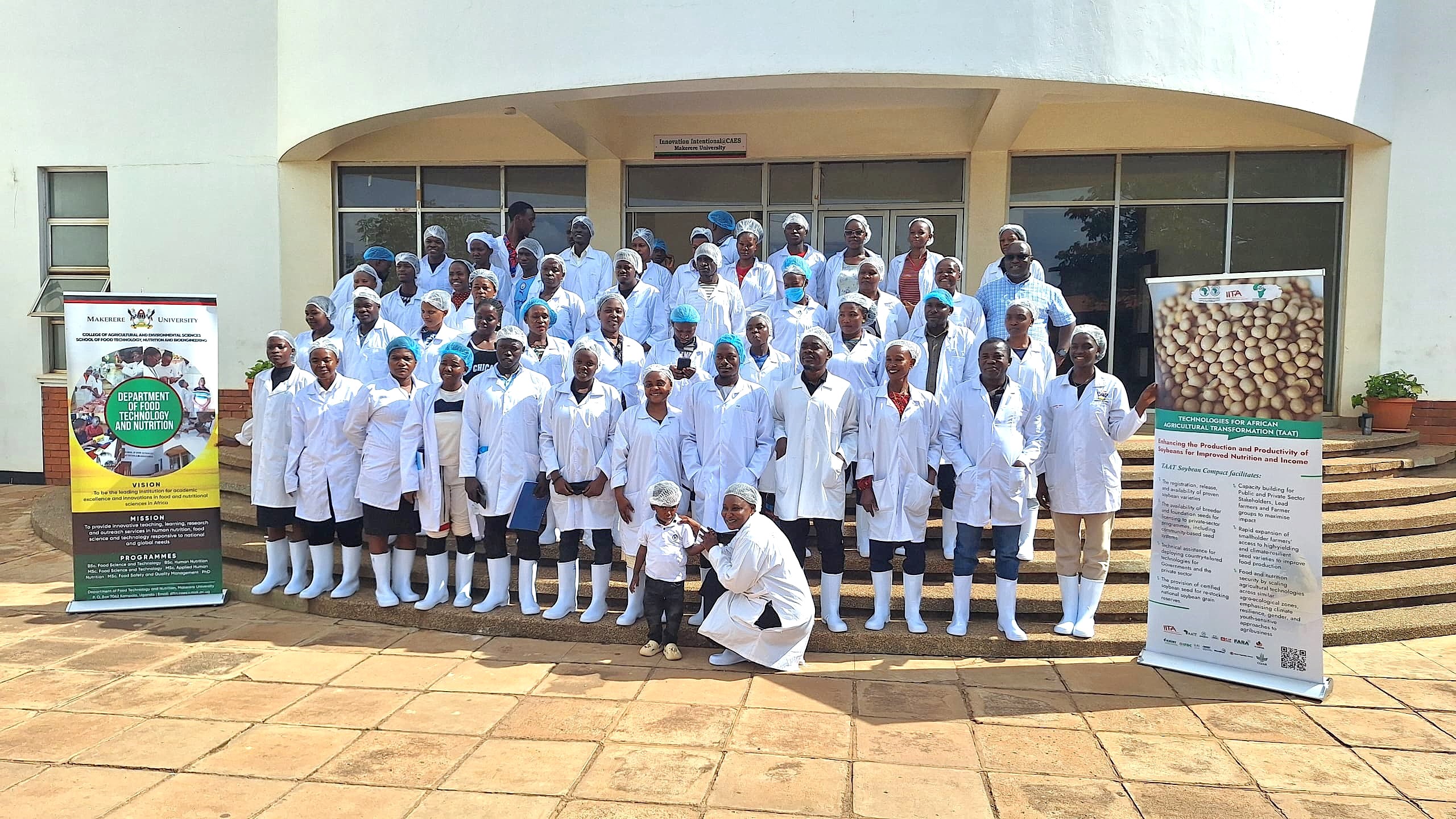
The Department of Food Technology and Nutrition (DFTN), Makerere University, in collaboration with Smart Foods Uganda Ltd, successfully conducted a five-day intensive training on soybean value addition and product development from 24th to 28th November 2025. The training was implemented with support from IITA Uganda under the Training for African Agricultural Transformation (TAAT) Soy Compact Project, aimed at strengthening agro-processing capacities and promoting soybean utilization for improved nutrition and livelihoods.
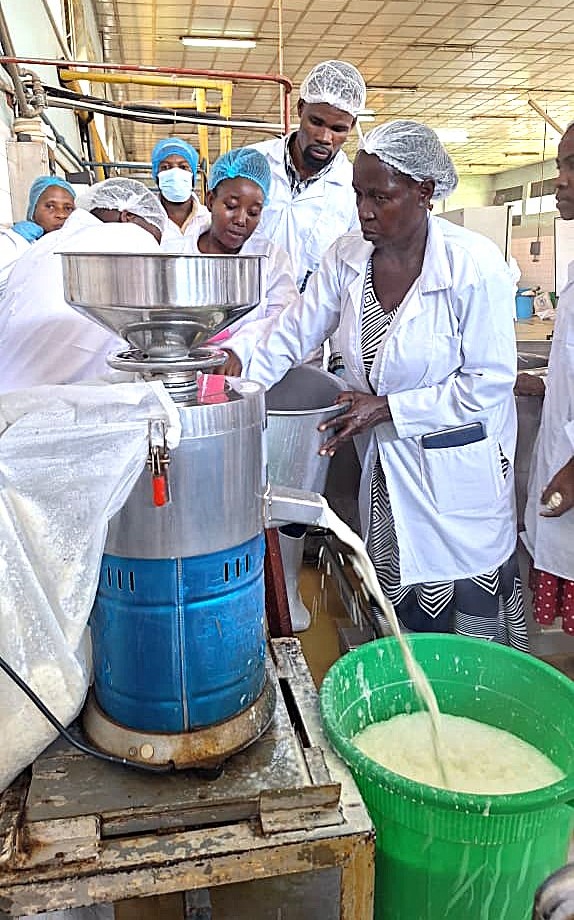
The training program was highly practical and skills-oriented, featuring extensive hands-on sessions designed to equip participants with applicable processing and product development competencies. Most of the practical activities were hosted at Makerere University’s Food Technology and Business Incubation Centre (FTBIC). Participants also benefited from an industry exposure and experiential learning session at Smart Foods Uganda Ltd in Bweyogerere, where they gained first-hand insights into commercial-scale soybean processing operations, quality control systems, and product marketing strategies.

Key thematic areas and technologies covered during the training included soybean nutrition and associated health benefits; assessment of quality attributes of soybeans and soy-based products; application of Good Hygiene Practices (GHP) and Good Manufacturing Practices (GMP); and processing of high-quality soy products. Practical sessions focused on the production of soymilk, tofu, soy yoghurt, soy flour, and soy coffee, as well as the formulation of soy-fortified composite porridge flours. Participants were also trained in the development of various soy-based bakery products, including bread, mandazi, daddies, and baghia. In addition, sessions on marketing, branding and positioning of soy products, as well as UNBS certification requirements and documentation, were conducted to enhance market readiness and regulatory compliance.
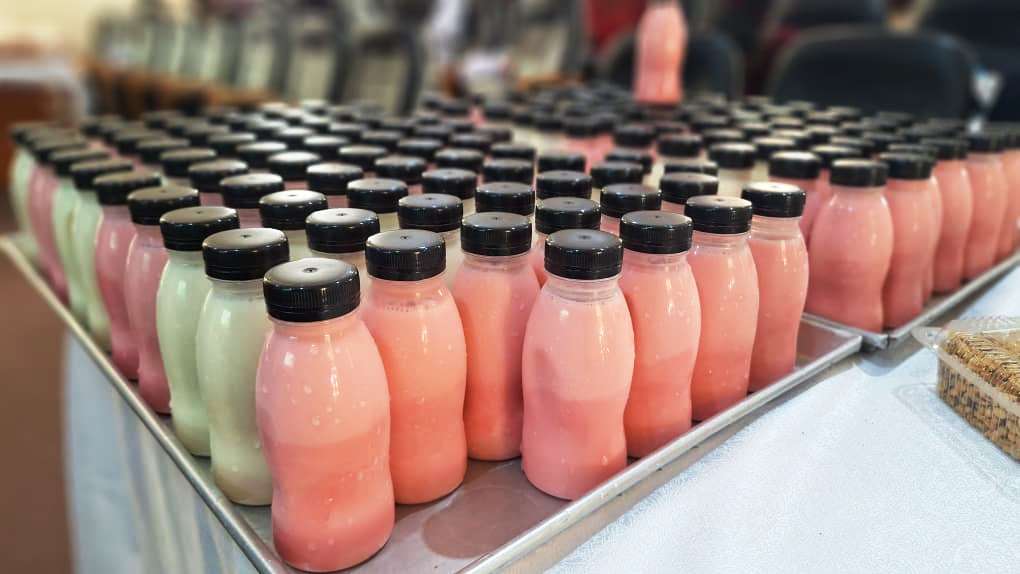
The training attracted a total of 57 participants, comprising small-scale soybean processors and graduating university students, thereby fostering knowledge exchange between academia and industry. Overall, the training contributed significantly to building technical capacity in soybean value addition, promoting entrepreneurship, and supporting the development of nutritious, market-oriented soy-based products in Uganda. The School of Food Technology, Nutrition, and Bioengineering, under the leadership of Dr. Julia Kigozi (Dean), conducts periodical trainings for agro-processors across the country to enhance technical capacity, improve product quality, and promote the adoption of modern, safe, and sustainable food processing practices. These trainings are designed to equip agro-processors with practical skills in food safety, quality assurance, value addition, post-harvest handling, nutrition, and bioengineering innovations, thereby enabling them to meet national and international standards. Through this outreach, the School contributes to strengthening agro-industrial development, reducing post-harvest losses, supporting entrepreneurship, and improving food and nutrition security while fostering stronger linkages between academia, industry, and communities.
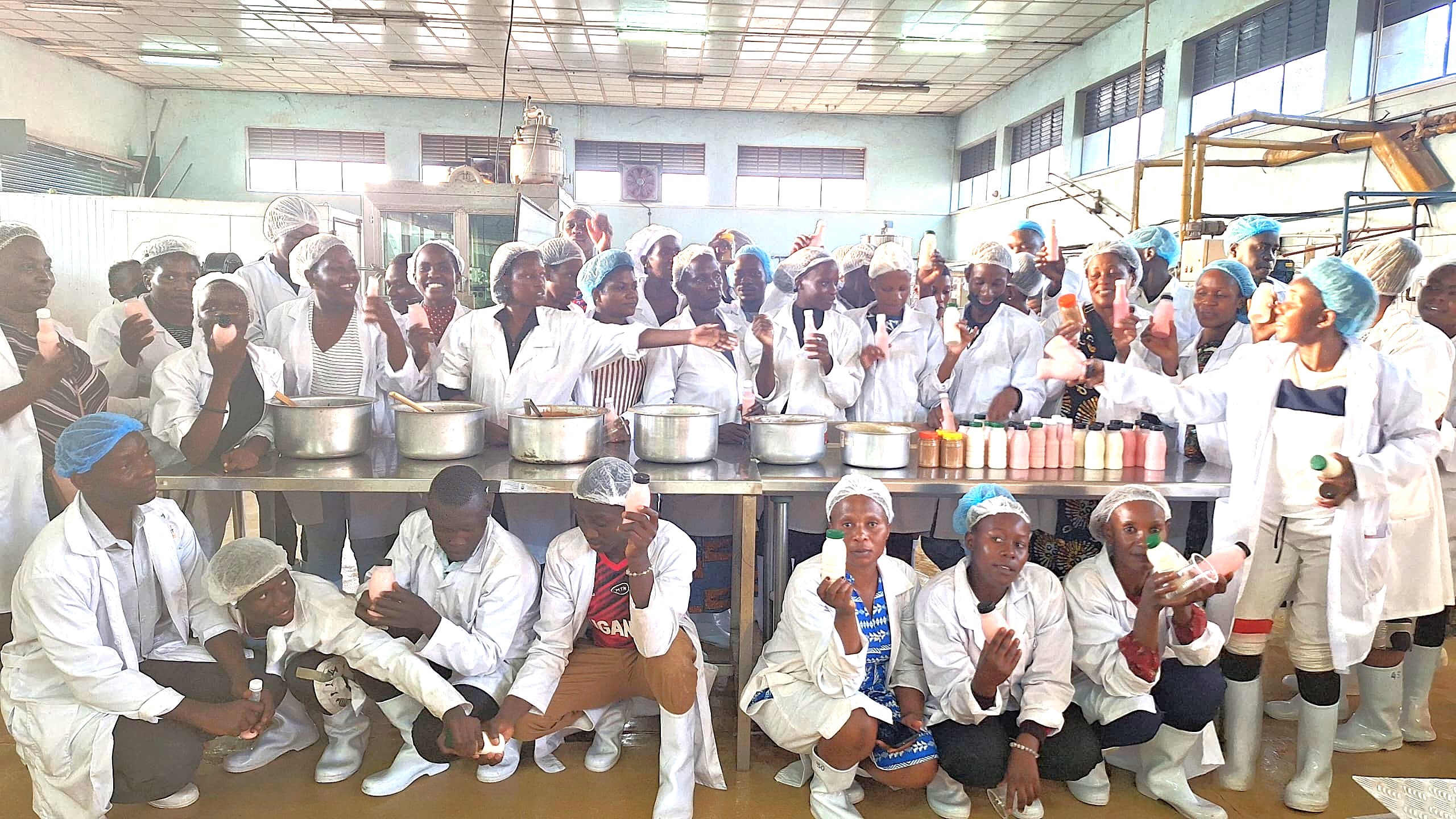
Agriculture & Environment
Department of Tourism Hosts Prof. Sofia Asonitou
Published
4 weeks agoon
December 12, 2025By
Mak Editor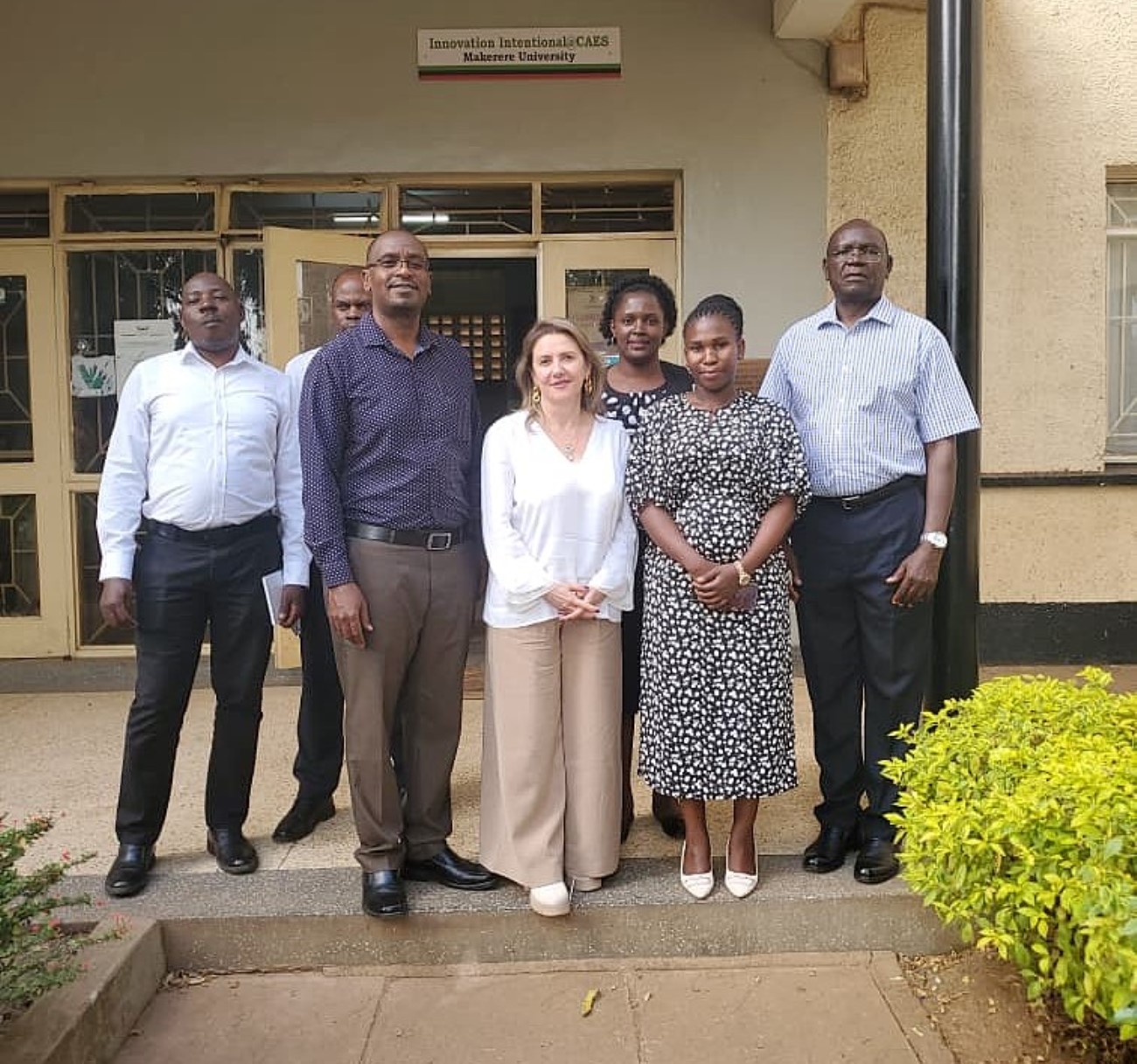
The Department of Tourism at the College of Agricultural and Environmental Sciences (CAES) on Thursday, 11 December 2025, hosted Prof. Sofia Asonitou from the University of West Attica, Greece. Prof. Asonitou serves as the Regional Coordinator for the Sub-Saharan Africa region under the Erasmus+ International Credit Mobility (ICM) framework at her institution.
During her engagement with the Department team led by Prof. Jim Ayorekire, deliberations centred on strengthening avenues for international academic cooperation.

The meeting highlighted several key areas of collaboration, including the initiation of student and staff exchanges under the Erasmus+ mobility program and capacity building in tourism governance. The team also explored the development of a joint masters degree program and the design of micro-credit courses aimed at addressing emerging skills gaps within the tourism sector.
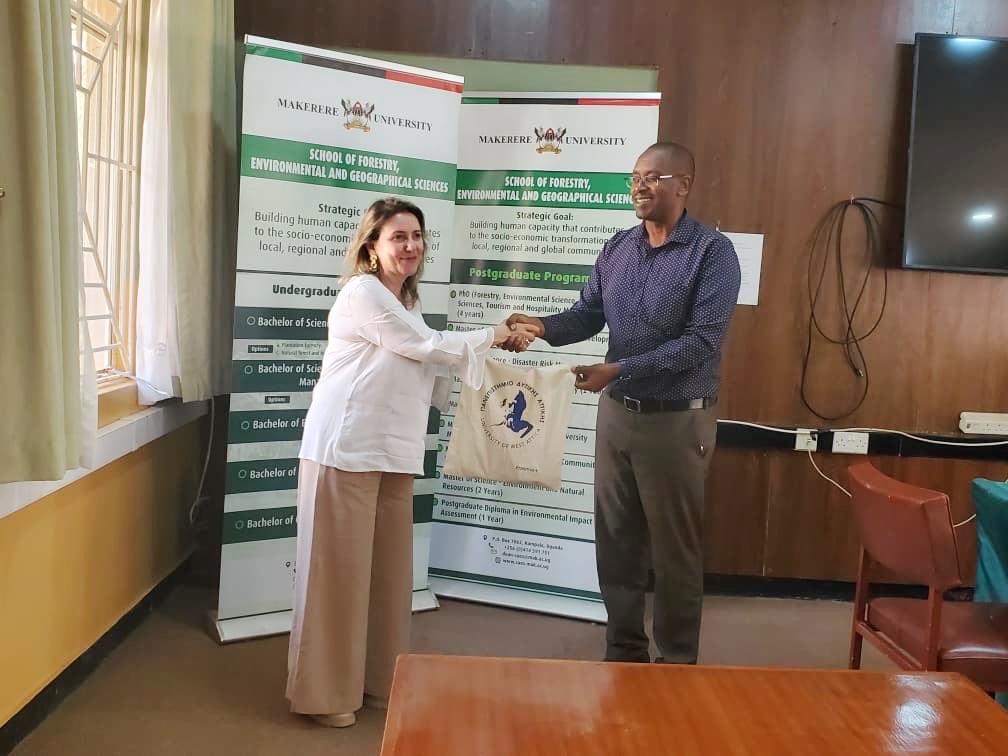
Prof. Asonitou’s visit marked an important step toward deepening institutional partnerships and enhancing the global outlook of tourism education and research within CAES.
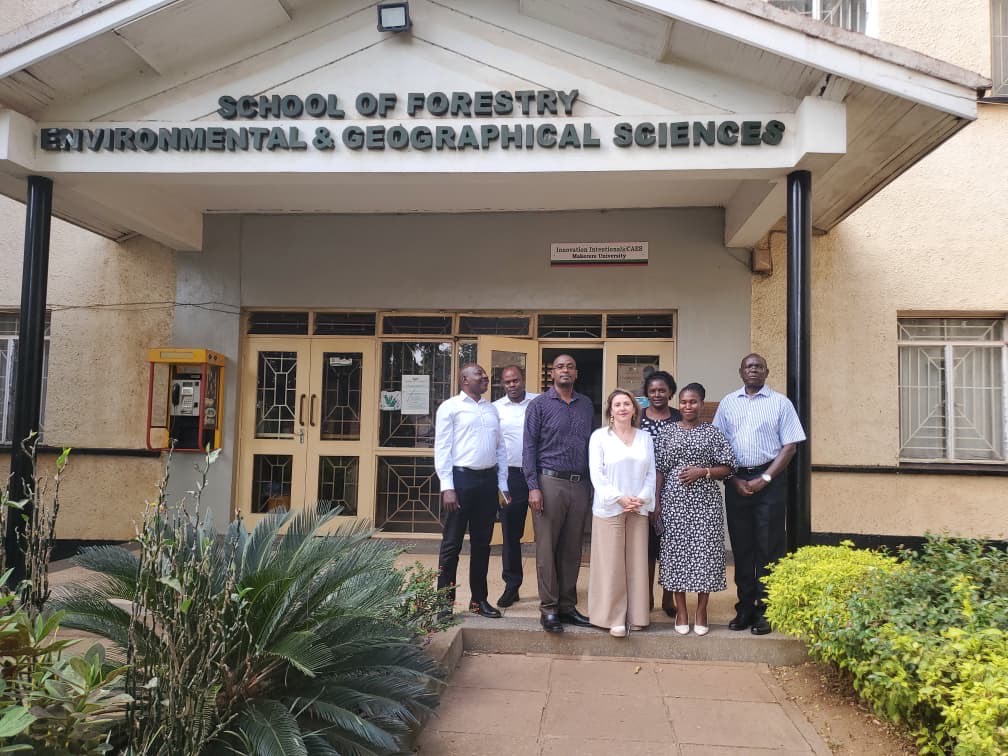
The Department of Tourism, which was carved out of the former Department of Forestry, Biodiversity, and Tourism, now operates as an independent academic unit offering a diverse and comprehensive range of programmes. The programmes are designed to equip students with the knowledge, skills, and practical experience necessary to thrive in various sectors of the tourism industry, including sustainable tourism development, hospitality management, and eco-tourism.
Agriculture & Environment
How transformative education is shaping Africa’s next generation of innovators
Published
1 month agoon
December 2, 2025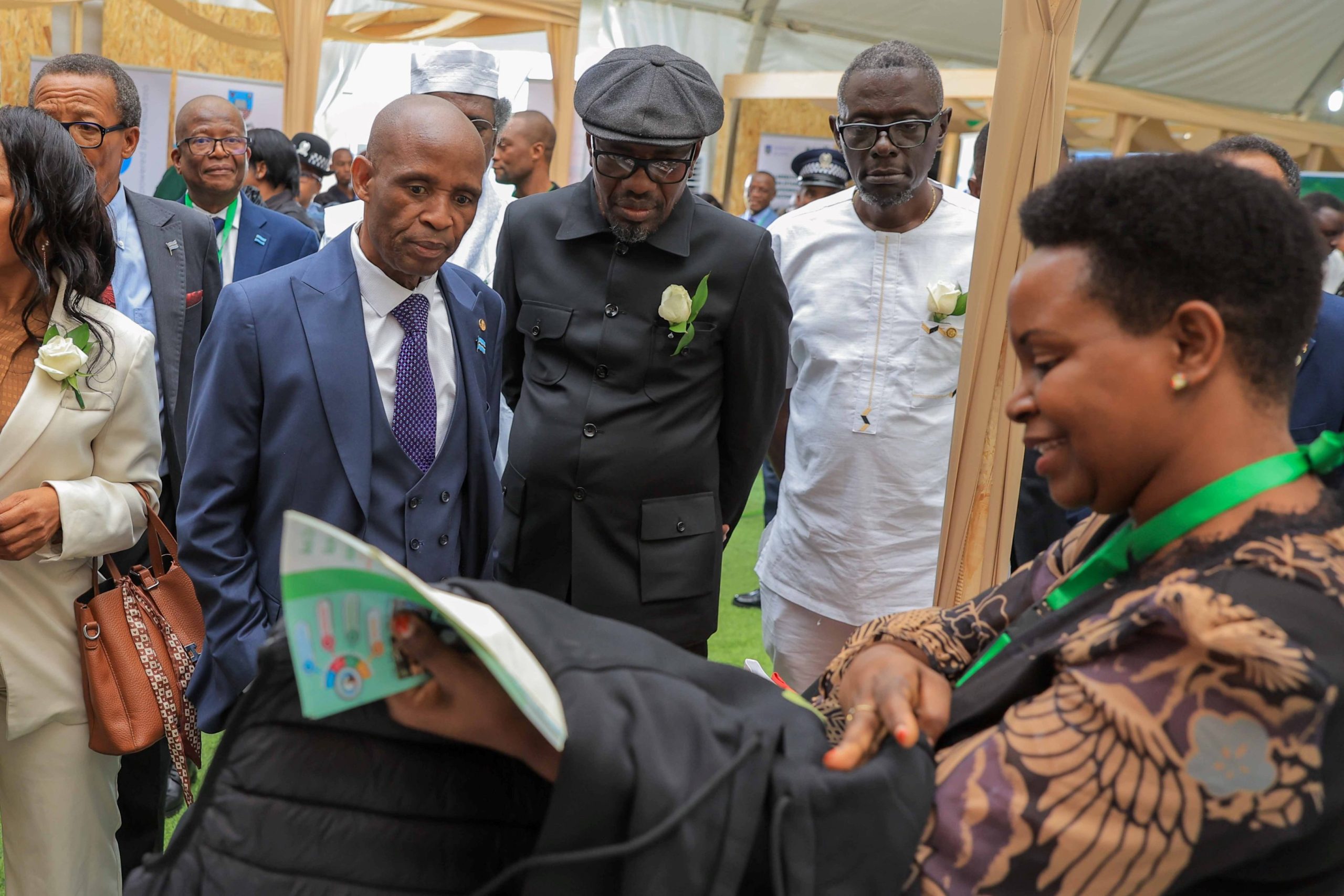
The African Union’s Agenda 2063 articulates a clear continental ambition; to unlock Africa’s potential to feed itself and to harness the transformative power of its greatest asset, its people. While natural resources remain abundant and diverse, Africa’s long-term prosperity hinges on the strategic cultivation of human capital through robust, forward-looking education systems.
Like many governments across the continent, the Government of Botswana, the host of the Regional Universities Forum for Capacity Building in Agriculture (RUFORUM)’s 21st Annual General Meeting (AGM), aligns closely with the Sustainable Development Goals of zero hunger and no poverty. It also upholds the collective aspirations of African Heads of State and Government expressed in the Kampala Declaration under the Comprehensive African Agricultural Development Programme (CAADP).
Against this backdrop, the pre-AGM session on transformative education and ecosystem engagement convened hundreds of scholars, policymakers, and thought leaders from Africa and beyond. The discussions underscored a shared urgency that strategic collaboration must move from concept to action if the continent is to confront its pressing challenges of food insecurity, public health vulnerabilities, conflict and displacement, youth unemployment, and the persistent pressures of migration. The message was clear; Africa’s transformation requires not isolated interventions, but integrated, interdisciplinary solutions.
In fulfilling the CAADP agenda, universities stand at the forefront. They must leverage every available opportunity to generate workable, evidence-based solutions through science, technology, and innovation. However, they cannot act alone. National Agricultural Research Systems, the private sector, civil society, and development partners must each play an indispensable role in strengthening Africa’s education and agricultural systems. Together, these institutions form the ecosystem that will determine whether Africa can translate its ambitions into tangible progress.
The Youth Dividend
Since its establishment at Makerere University in Uganda in 2004, RUFORUM has supported the training of more than 3000 students across the continent at PhD, Masters, undergraduate and Technical and Vocational Education and Training (TVET) level. These scholars, drawn from diverse African countries and hosted in universities across the region, represent a deliberate investment in building Africa’s scientific capacity and advancing pan-African collaboration. Notably, 98% of RUFORUM-supported graduates continue to work within their home countries or regions, reinforcing national and regional development efforts.
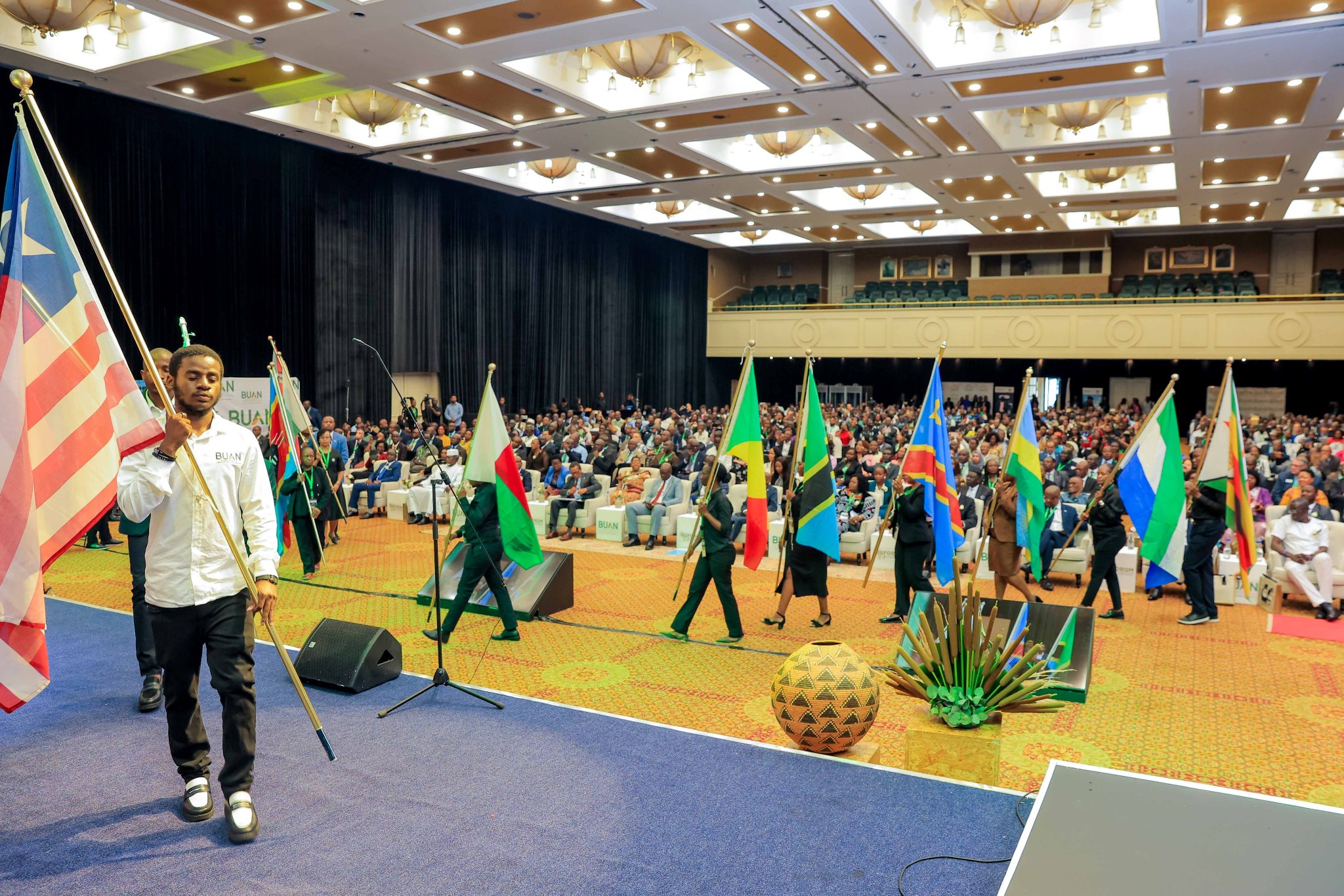
A key contributor to this impact is the Mastercard Foundation supported initiative, Transforming African Agricultural Universities to Meaningfully Contribute to Africa’s Growth and Development (TAGDev2.0). This programme strengthens universities, Technical, and Vocational Education and Training (TVET) institutions to drive inclusive, equitable, and climate-resilient transformation of agriculture and agri-food systems. Through experiential learning, practical skills development, and youth empowerment, TAGDev enhances the ability of young Africans to engage meaningfully in agriculture as innovators, leaders, and entrepreneurs.
Across both TAGDev 1.0 and 2.0, thousands of young women and men have been equipped to establish profitable enterprises and create employment opportunities within their communities.
This transformative impact was evident during a keynote address by Dr. Yeukai Mlambo from the MasterCard Foundation followed by a panel session where four young entrepreneurs and beneficiaries of RUFORUM MasterCard supported programmes, shared their journeys. Their enterprises span a wide spectrum. From improving and multiplying high-quality potato seed in Nakuru Kenya by Winnie Wambugu, to equipping differently abled persons (PWDs) with agronomy and entrepreneurship skills in Uganda by Zena Saliru, to skilling refugees in the west Nile region of Uganda by Gordon Victor Akejo to supporting out-of-school youth to become self-reliant by Kato Omia. These stories illustrate not only the ingenuity of Africa’s youth but also the importance of sustained investment in higher education and innovation ecosystems. They embody the youth dividend that Africa stands to gain if it continues to nurture the potential of its young people.
A moment Africa cannot afford to miss
As the conversations by the young entrepreneurs have made clear, Africa stands at a pivotal moment. The continent’s aspirations captured in Agenda 2063, the SDGs, and the CAADP commitments cannot be realised through intention alone. They demand systems that elevate human capital, institutions that collaborate rather than compete, and education models that prepare young people not merely to seek opportunity but to create it.
The stories shared by emerging entrepreneurs and young scientists are more than inspiring anecdotes; they are proof points. They show that when universities are empowered, when partnerships are genuine, and when young people are trusted with the tools and mentorship they need, transformation is already underway.
The scale of Africa’s challenges requires an equal scale in commitment by Governments, universities, research organisations, the private sector, and development partners who must deepen investments in higher education, innovation ecosystems, and youth-focused initiatives. Failure to do so risks squandering one of the continent’s most powerful assets, its demographic dividend.
Africa must therefore double down on transformative education and ecosystem-led collaboration. The momentum witnessed in Botswana should not end with the AGM. It should mark the beginning of renewed resolve to equip Africa’s young people with the skills, networks, and support they need to lead the continent’s next chapter.
The future is already taking shape in laboratories, fields, innovation hubs, and classrooms across the continent. It is time to scale what works and ensure that Africa’s brightest minds are empowered to build the strong and prosperous nations they envision. Collectively, we shall all achieve the Africa that we want.
Trending
-

 General1 week ago
General1 week agoAdvert for the Position of the Second Deputy Vice Chancellor
-

 Law2 days ago
Law2 days agoDisclaimer Notice: LLB Pre-Entry Examination
-

 General1 week ago
General1 week agoUNDP and JNLC hold training in Fort Portal: Participants equipped with skills in Advocacy and Gender Equality, Team Building, Inclusive Leadership, and Financial Literacy
-

 General1 week ago
General1 week agoBreaking the Silence on Digital and Gender-Based Violence: Male Changemakers Lead Makerere University’s Strides for Change
-
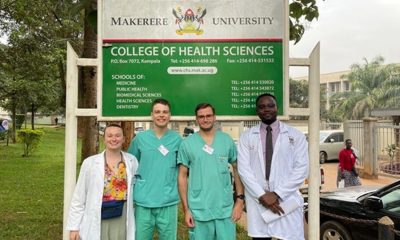
 Health1 week ago
Health1 week agoMakCHS Strengthens Internationalization through Strategic Global Partnerships and Mobility
